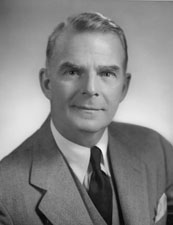John Marshall Butler
| John Marshall Butler | |
|---|---|
 |
|
|
United States Senator from Maryland |
|
|
In office January 3, 1951 – January 3, 1963 |
|
| Preceded by | Millard Tydings |
| Succeeded by | Daniel Brewster |
| Personal details | |
| Born |
July 21, 1897 Baltimore, Maryland |
| Died | March 14, 1978 (aged 80) Rocky Mount, North Carolina |
| Nationality | American |
| Political party | Republican |
| Alma mater |
Johns Hopkins University University of Maryland Law School |
| Religion | Methodist |
| Military service | |
| Service/branch | United States Army |
| Years of service | 1917–1919 |
| Battles/wars | World War I |
John Marshall Butler (July 21, 1897 – March 14, 1978) was an American lawyer and politician. A Republican, he served as a United States Senator from Maryland from 1951 to 1963.
John Butler was born in Baltimore, Maryland, to John Harvey and Eunice West (née Riddle) Butler. He received his early education at public schools in his native city, and worked as a paperboy and later an employee at a mattress factory. During World War I, he served as a private in 110th Field Artillery (29th Division) of the U.S. Army from 1917 to 1918.
Following his military service, he returned to Baltimore and attended Johns Hopkins University (1919-1921) before joining his father's real estate business. He studied nights at the University of Maryland School of Law, where he received his law degree in 1926. After his admission to the bar, he joined the Baltimore law firm of Venable, Baetjer & Howard, where he worked until 1950. He served as a member of City Service Commission of Baltimore from 1947 to 1949.
In 1950, Butler was elected as a Republican to the United States Senate from Maryland. In the Republican primary, he lost the popular vote to D. John Markey by a margin of 51%-49%, but won the nomination after receiving a larger unit vote count at the state convention. In the general election, he faced four-term Democratic incumbent Millard Tydings. Butler received strong support from Senator Joseph McCarthy of Wisconsin, whose accusations of Communist infiltration into the State Department had been rejected by the Tydings Committee. During the campaign, McCarthy's staff distributed a pamphlet that featured a falsified photograph showing Tydings with Communist leader Earl Browder. Butler eventually defeated Tydings by a margin of 53%-46%.
...
Wikipedia
